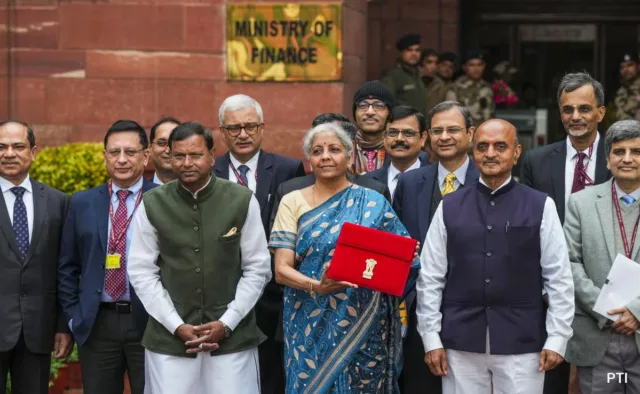In a bid to propel economic growth and ensure fiscal stability, India’s Finance Minister, Nirmala Sitharaman, presented the interim budget for the fiscal year 2024–25 on February 1, 2024. This interim budget, delivered just ahead of the upcoming Lok Sabha Elections, outlines significant allocations for infrastructure development while maintaining a focus on long-term reforms and fiscal consolidation.
Infrastructure Investment and Fiscal Outlook
The cornerstone of the interim budget lies in infrastructure spending, with plans to allocate nearly $134 billion towards this crucial sector. Sitharaman emphasized the importance of infrastructure development in driving growth and announced a series of measures aimed at bolstering this critical area. Notably, the budget includes provisions for a corpus of 1 trillion rupees to be set up with a 50-year interest-free loan for research in the sunrise sector, alongside substantial allocations for railways and road transport.
Despite pressures to increase spending ahead of the elections, the government has managed to narrow the fiscal deficit target for the next fiscal year to 5.1% of GDP, down from the revised estimate of 5.8% for the current fiscal year. This reduction reflects the government’s commitment to maintaining fiscal prudence while addressing the country’s developmental needs.
Key Highlights of the Interim Budget
- Economic Growth: The interim budget forecasts nominal GDP growth of 10.5% year-on-year for 2024/25, highlighting the government’s proactive measures to stimulate economic activity. Sitharaman pointed out that inflation has moderated and economic growth has picked up, crediting pro-active inflation management for containing inflation within the target band of 2%–6%.
- Infrastructure Spending: The budget allocates substantial resources towards infrastructure, with a focus on enhancing connectivity and modernizing key sectors. Notable allocations include funds for railways, road transport, and renewable energy projects, underscoring the government’s commitment to fostering sustainable development.
- Taxation Policy: In a move aimed at providing stability to the taxation regime, no changes were announced in the tax structure. The government reiterated its commitment to widening the tax base and increasing tax collections through reforms, while also extending tax exemptions for investments by sovereign wealth funds and pension funds for another year.
- Increase in Spending: The interim budget envisages a significant increase in federal spending across key sectors such as education, health, and affordable housing. These investments are aimed at addressing critical social and developmental challenges while fostering inclusive growth and improving the standard of living for all citizens.
- Focus on Subsidies: The budget maintains subsidies for essential sectors such as fertilizers and food, ensuring continued support for farmers and vulnerable segments of the population. Additionally, investments in rural development programs underscore the government’s commitment to inclusive growth and poverty alleviation.
- Fiscal Deficit Management: Despite the challenges posed by increased spending, the government has managed to reduce the fiscal deficit target for 2024–25, reflecting its commitment to fiscal discipline and prudent financial management.
The unveiling of the interim budget has elicited a positive response from various stakeholders, including investors and market analysts. Stock markets opened on a positive note, reflecting optimism regarding the government’s fiscal prudence and commitment to infrastructure development. Notably, the budget’s emphasis on infrastructure spending and long-term reforms has been hailed by industry experts as a positive step towards stimulating economic growth and attracting private investment. Nilesh Shah, managing director at Kotak Mahindra Asset Management, lauded India’s achievements in enhancing infrastructure investment while maintaining fiscal prudence, highlighting the potential for sustained economic development.
Moreover, Sitharaman’s announcements regarding the development of air connectivity and the promotion of tourism have been met with enthusiasm, signaling opportunities for growth and job creation in these sectors. The allocation of interest-free loans to states to boost tourism underscores the government’s commitment to harnessing India’s vast potential in the tourism industry. Looking ahead, the interim budget sets the stage for a robust economic recovery and lays the foundation for sustainable development in the years to come. As the nation navigates through the challenges posed by the ongoing pandemic and global economic uncertainties, the government’s proactive measures and strategic investments are expected to drive India’s growth trajectory forward.
In summary, India’s interim budget for 2024–25 reflects a balanced approach towards promoting economic growth, fostering infrastructure development, and ensuring fiscal sustainability. With a focus on long-term reforms and inclusive development, the budget sets the stage for the country’s economic trajectory in the years to come. As the nation prepares for the upcoming elections, the interim budget serves as a roadmap for the government’s priorities and aspirations, laying the groundwork for a prosperous and resilient future.









